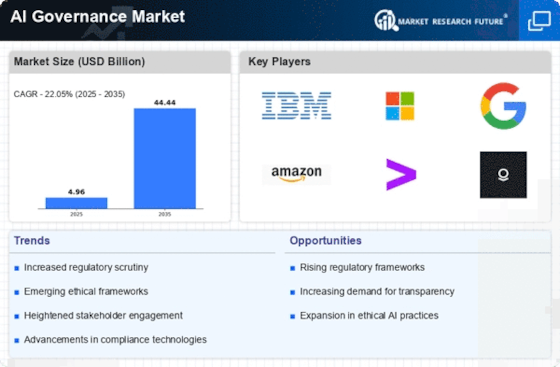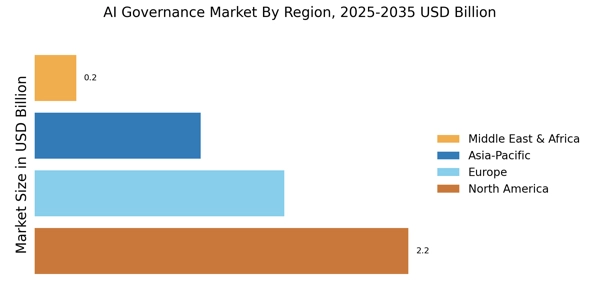Collaboration Among Stakeholders
Collaboration among stakeholders is emerging as a pivotal driver in the AI Governance Market. As the landscape of AI technologies evolves, various stakeholders, including governments, private sector entities, and civil society organizations, are recognizing the necessity of working together to establish effective governance frameworks. This collaborative approach fosters the sharing of best practices, resources, and knowledge, ultimately enhancing the overall governance of AI systems. The AI Governance Market is likely to benefit from this trend, as partnerships and alliances are formed to address common challenges and promote ethical AI usage. By leveraging collective expertise, stakeholders can develop comprehensive governance strategies that align with societal values and regulatory requirements, thereby strengthening the integrity of AI technologies.
Investment in AI Risk Management
Investment in AI risk management is becoming a critical driver for the AI Governance Market. As organizations deploy AI systems across various sectors, they face potential risks related to bias, security, and operational failures. Consequently, there is a growing recognition of the need for robust risk management frameworks that can identify, assess, and mitigate these risks effectively. The AI Governance Market is witnessing increased funding directed towards developing risk management solutions that address these challenges. In 2025, the market is expected to see a substantial rise in investments aimed at enhancing risk assessment capabilities and ensuring that AI systems operate safely and ethically. This trend underscores the importance of proactive governance in navigating the complexities associated with AI technologies.
Technological Advancements in AI
Technological advancements in AI are propelling the AI Governance Market forward. Innovations in machine learning, natural language processing, and data analytics are creating new opportunities for organizations to implement effective governance strategies. These advancements enable companies to monitor AI systems more efficiently, ensuring they operate within ethical boundaries and comply with regulatory standards. As organizations increasingly adopt AI technologies, the demand for governance solutions that can adapt to rapid technological changes is likely to rise. The AI Governance Market is projected to benefit from this trend, with investments in governance tools and frameworks expected to increase significantly. This dynamic environment suggests that organizations must remain agile and responsive to technological developments to maintain compliance and ethical standards.
Regulatory Compliance Requirements
The AI Governance Market is experiencing a surge in demand due to the increasing regulatory compliance requirements imposed by governments and international bodies. As organizations strive to adhere to these regulations, they are compelled to invest in AI governance frameworks that ensure transparency, accountability, and ethical use of AI technologies. The market is projected to grow as companies seek to mitigate risks associated with non-compliance, which can lead to substantial fines and reputational damage. In 2025, the estimated value of the AI Governance Market is expected to reach several billion dollars, driven by the need for robust compliance mechanisms. This trend indicates a shift towards more structured governance models that align with regulatory expectations, thereby fostering trust among consumers and stakeholders.
Growing Public Awareness of AI Ethics
The growing public awareness of AI ethics is influencing the AI Governance Market. As consumers become more informed about the implications of AI technologies, they are demanding greater accountability and ethical considerations from organizations. This shift in public sentiment is prompting companies to prioritize ethical AI practices, which in turn drives the need for comprehensive governance frameworks. Organizations are increasingly recognizing that ethical AI is not just a regulatory requirement but also a competitive advantage. The AI Governance Market is likely to expand as businesses invest in initiatives that promote transparency and ethical decision-making in AI deployment. This trend indicates a broader societal expectation for responsible AI usage, compelling organizations to align their governance strategies with these emerging values.

















